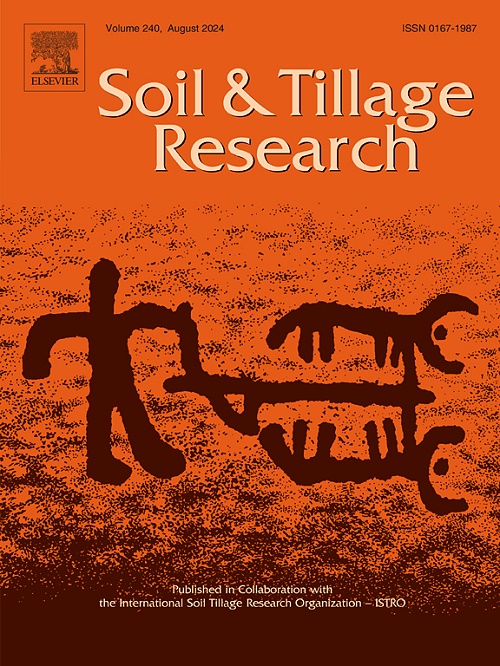以长期野外植被重建实验为试验平台,首次验证煤矿开采区土壤结构目视评估方法
IF 6.1
1区 农林科学
Q1 SOIL SCIENCE
引用次数: 0
摘要
表土压实是矿山土壤中的一个老大难问题,危及矿区的植被重建和生态复垦。通过定量方法评估土壤结构质量(Sq)通常需要耗费大量人力和/或成本,尤其是在需要对大面积土壤进行检测的情况下。因此,兼顾成本效益和准确诊断矿区土壤结构质量至关重要。土壤结构目测评估法(VESS)是一种基于铲子的方法,可将土壤质量从 1 分(好)到 5 分(差)进行评分,但该方法尚未在矿山土壤中得到验证,而这正是本研究的目的所在。我们利用我们的长期田间试验,在该试验中,用于雷区土壤再植被的多年生牧草的定量物理属性各不相同,从而创建了一个 Sq 范围,供 VESS 筛选。位于巴西南部的雷区用 Hemarthria altissima、Paspalum notatum、Cynodon dactylon 和 Urochloa brizantha 进行了 14.3 年的植被重建。矿土(0.00-0.10 米和 0.10-0.20 米层)的质量通过 VESS 和集料抗拉强度(TS)、土壤宏观集料和微观集料(%)、土壤有机质(SOM)含量、容重(BD)、宏观孔隙度(MaP)、微观孔隙度、总孔隙度(TP)和土壤渗透阻力(PR)进行评估。通过 VESS 分数与 TS、MaP、宏观集聚物(%)、微观集聚物(%)、TP、SOM,尤其是 BD(r = 0.60)和 PR(r = 0.56)之间的显着相关性,我们发现 VESS 是可靠评估矿土 Sq 的合适方法。VESS 分数 2.0-3.1 证实,与 0.10-0.20 米(2.7-3.5)相比,0.00-0.10 米样本的 Sq 有所改善,主成分分析法将 0.00-0.10 米样本与 SOM、宏观集聚物(%)、MaP 和 TP 一起排序也证实了这一点。此外,VESS 证实,在 0.10-0.20 米处,H. altissima 的 Sq 值(2.7)比 C. dactylon 的 Sq 值(3.6)高,这可能是由于土壤中的 MaP、TP、大骨料(%)和 SOM 增加所致。在这项开创性的研究中,我们验证了 VESS 是一种监测亚热带粘质矿土 Sq 的实用且有科学依据的方法。本文章由计算机程序翻译,如有差异,请以英文原文为准。
First validation of the method Visual Evaluation of Soil Structure in coal mining area using a long-term field revegetation experiment as testbed
Topsoil compaction is a persistent problem in minesoils, jeopardizing the revegetation and ecological reclamation of the mined land. Evaluation of soil structural quality (Sq) through quantitative methods is usually labor-intensive and/or costly, especially if a large area has to be examined. Therefore, reconciling cost-effective and accurate diagnose of minesoil Sq is crucial. The Visual Evaluation of Soil Structure (VESS) is a spade-based method scoring the soil Sq from 1 (good) to 5 (poor), which has not yet been validated for minesoils, and this was exactly the aim of this study. We made use of our long-term field experiment where quantitative physical attributes differed between perennial grasses used for minesoil revegetation, creating a Sq range to be screened by VESS. The minesoil, located in Southern Brazil, was revegetated for 14.3 years with Hemarthria altissima, Paspalum notatum, Cynodon dactylon, and Urochloa brizantha. The Sq of the minesoil (0.00–0.10 and 0.10–0.20 m layer) was evaluated by VESS and tensile strength of aggregates (TS), soil macroaggregates and microaggregates (%), soil organic matter (SOM) content, bulk density (BD), macroporosity (MaP), microporosity, total porosity (TP), and soil penetration resistance (PR). Through significant correlations between VESS scores and TS, MaP, macroaggregates (%), microaggregates (%), TP, SOM and especially BD (r = 0.60) and PR (r = 0.56), we found VESS to be a suitable method for reliable assessment of minesoil Sq. VESS scores 2.0–3.1 confirmed improved Sq at 0.00–0.10 m compared to 0.10–0.20 m (2.7–3.5), and this was supported by the ordination of 0.00–0.10 m samples together with SOM, macroaggregates (%), MaP and TP by principal component analysis. Moreover, VESS confirmed improved Sq in H. altissima (2.7) compared to C. dactylon (3.6) at 0.10–0.20 m, likely due to gains in soil MaP, TP, macroaggregates (%) and SOM. In this pioneering study we validated VESS as a practical and science-grounded method to monitor the Sq of a clayey subtropical minesoil.
求助全文
通过发布文献求助,成功后即可免费获取论文全文。
去求助
来源期刊

Soil & Tillage Research
农林科学-土壤科学
CiteScore
13.00
自引率
6.20%
发文量
266
审稿时长
5 months
期刊介绍:
Soil & Tillage Research examines the physical, chemical and biological changes in the soil caused by tillage and field traffic. Manuscripts will be considered on aspects of soil science, physics, technology, mechanization and applied engineering for a sustainable balance among productivity, environmental quality and profitability. The following are examples of suitable topics within the scope of the journal of Soil and Tillage Research:
The agricultural and biosystems engineering associated with tillage (including no-tillage, reduced-tillage and direct drilling), irrigation and drainage, crops and crop rotations, fertilization, rehabilitation of mine spoils and processes used to modify soils. Soil change effects on establishment and yield of crops, growth of plants and roots, structure and erosion of soil, cycling of carbon and nutrients, greenhouse gas emissions, leaching, runoff and other processes that affect environmental quality. Characterization or modeling of tillage and field traffic responses, soil, climate, or topographic effects, soil deformation processes, tillage tools, traction devices, energy requirements, economics, surface and subsurface water quality effects, tillage effects on weed, pest and disease control, and their interactions.
 求助内容:
求助内容: 应助结果提醒方式:
应助结果提醒方式:


